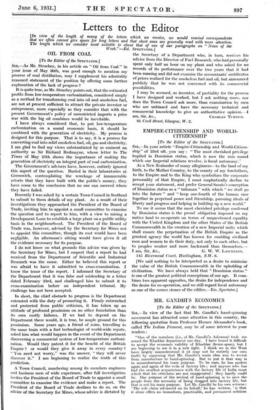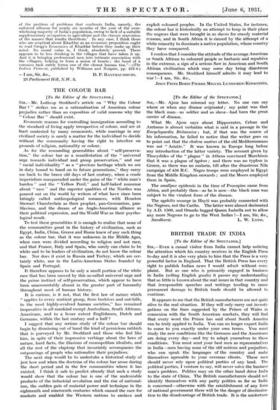MR. GANDHI'S ECONOMICS
[To the Editor of the SPECTATOR.]
SIR,--In view of the fact that Mr. Gandhi's hand-spinning movement has 'attracted some attention in this country, the following quotation from Professor Horace Alexander's book, called The Indian Ferment, may be of some interest to your readers : "One of the members (i.e., of Mr. Gandhi's Ashrarna) took mo round the 'Cheddar department one day. I have found it difficult to accept the economic validity of Khaddar (home-spun), but, I am beginning to see it in a new light. I think we in the West have largely misunderstood it (it may not be entirely our own fault) by supposing that Mr. Gandhi's main idea was to revert from manufacture to hand-spinning. But to put it that way is to misunderstand his main purpose. To be sure, he has spoken again and again of the evils of factory life ; and anyone who has had the smallest acquaintance with the factory life of India must admit that his criticisms are not exaggerated : they hardly could be. One purpose of the revival of hand-spinning is to save the people from the necessity of being dragged into factory life, but that is not his main purpose. Let Mr. Gandhi be his own witness : ' The sole claim advanced on its behalf,' he has written, is that it alone offers an immediate, practicable, and permanent solution of the problem of problems that confronts India, namely, the enforced idleness for nearly six months of the year of the over- whelming majority of India's population, owing to lack of a suitable supplementary occupation to agriculture and the chronic starvation of the masses that results' therefrom.' In any case, I think those who are sceptical about Khaddar as an economic proposition ought to read Gregg's Economics of Khaddar before they make up their mind. Its moral value is, I think, absolutely proved. There appears to be less drinking in the villages that have taken it up. And it is bringing professional men into intimate association with the villagers, helping to form a union of hearts ; the bond of a common task surely forms one of the closest human ties."—(The Indian Ferment, published by Williams and Norgate, pp. 223-4.) 23 Parliament Hill, N.W . 3.







































 Previous page
Previous page